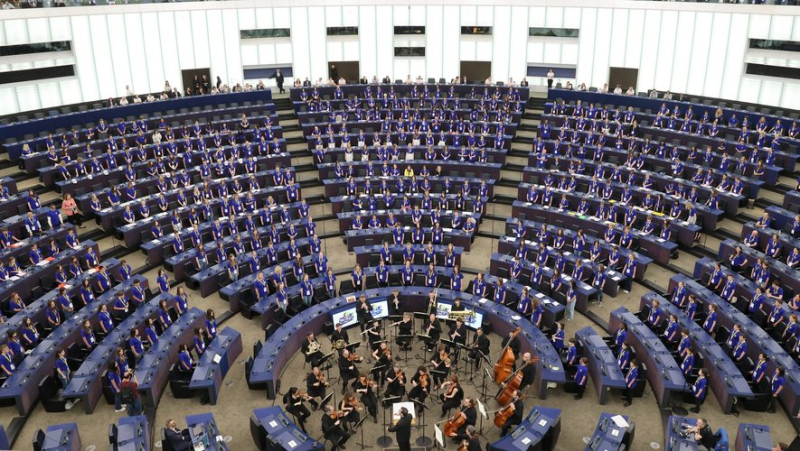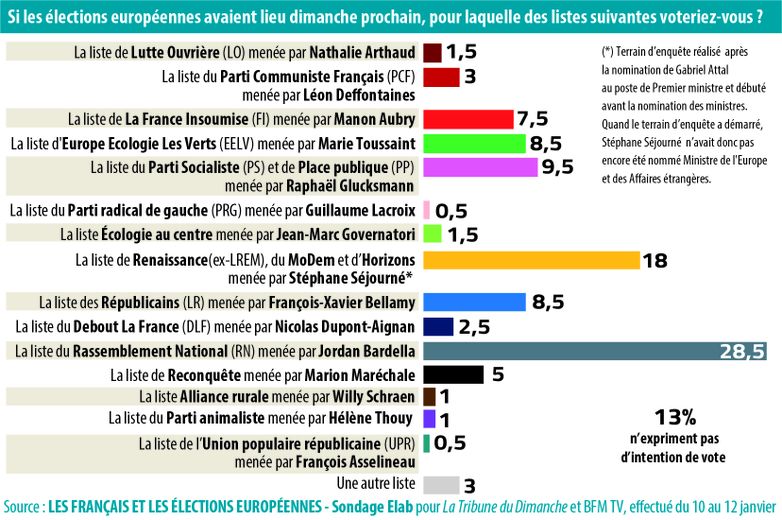European elections: five months before the vote, the EU faces a rise in the far right

Jouera-t-on une autre musique au Parlement européen après le 9 juin ? Voire… MAXPPP – Laurent REA
Will the rise of radical right parties in several EU countries upset the political balance in the European Parliament after the elections ? First elements of response.
Who would you vote for if the European elections of June 9 took place this Sunday ? To this question asked to representative panels by several polling institutes, the answers have not varied for several weeks.
They all converge on the results posted this weekend by La Tribune Dimanche, for example, on the basis of Elab's opinion survey: the National Rally is well ahead, preceding the Renaissance list by around ten points (tested with Stéphane Séjourné as leader, which does not will not be the case since he was appointed Minister of Foreign Affairs and Europe).
Then, far behind, in order, the Socialist Party, the Republicans, the Greens and La France insoumise, stand at one or two points, each remaining below the 10% mark, scores considered encouraging (for the PS, which has come a long way) or worrying (ecologists hope for better) depending on the case.
Positions which remain frozen for the moment
Either estimates that are approximately identical to those of an Odoxa survey carried out in mid-December for the Public Senate channel.
In other words: the positions remain fixed. Particularly in favor of the radical right which, if to the voting intentions attributed to the RN we add those allocated to Reconquête (the party of Éric Zemmour with Marion Maréchal at the head of the list) and to Debout la France of Nicolas Dupont-Aignan , familiar to the 40%.
And to consider an evolution of the curves, we will have to wait to know what possible effects the composition of the new government, the arrival of Gabriel Attal in Matignon, or the announcements will have on the electorate d’Emmanuel Macron during his press conference.
"I will fight until the last quarter of an hour"
A meeting during which the Head of State showed himself to be particularly virulent, during the most offensive moment of his intervention, against the National Rally which he continues moreover sometimes calling it National Front, as if to emphasize that the party of Marine Le Pen and Jordan Bardella (he will lead the RN list, as in 2019) has not really changed.

Elab poll for La Tribune on Sunday and BFM TV. A.LLOP
"I will fight until the last quarter of an hour" he even said about the training created by Jean-Marie Le Pen, and which had already finished in first place in the European elections of 2019 and 2014. And for which the President of the Republic did not have harsh enough words, calling it a "party of collective impoverishment" ;, of the "party of transformism", of the apostle of the "hidden Frexit", of the "party of lies".
In the Netherlands or Italy, Hungary or Finland
Previously, in opening this chapter, he had noted that "everywhere in Europe", the extreme right "is rising through a form of fascination with disaster, by a weakening of the collective, because we all forget to return to reality and the reality of their arguments.
The observation of this surge can be supported by a number of recent examples: in the Netherlands, at the end of 2023, the Freedom Party of Geert Wilders won the legislative elections, while the Fratelli d’Italia party, of Giorgia Meloni, came first in the 2022 parliamentary elections, authorizing her appointment to the post of President of the Council.
Divergences within these parties
In other EU countries (such as Finland or Slovakia), far-right parties are members of government coalitions, or support existing governments without participating (this is the case in Sweden). Without forgetting these governments that we describe as illiberal, generally ultra-authoritarian, conservative, nationalist, populist, and, at the very least, Eurosceptic, like that of Viktor Orban in Hungary, or of those settled in Poland until Donald Tusk's victory in the legislative elections in mid-October.
Hence this serious trend disrupting the political balances of the European Parliament (where two extreme right groups are represented, the ECR, and the ID, where it sits the RN) after the June election, there are still a few steps to take. Particularly because these parties of the most radical right often display deep differences, particularly on economic issues.




